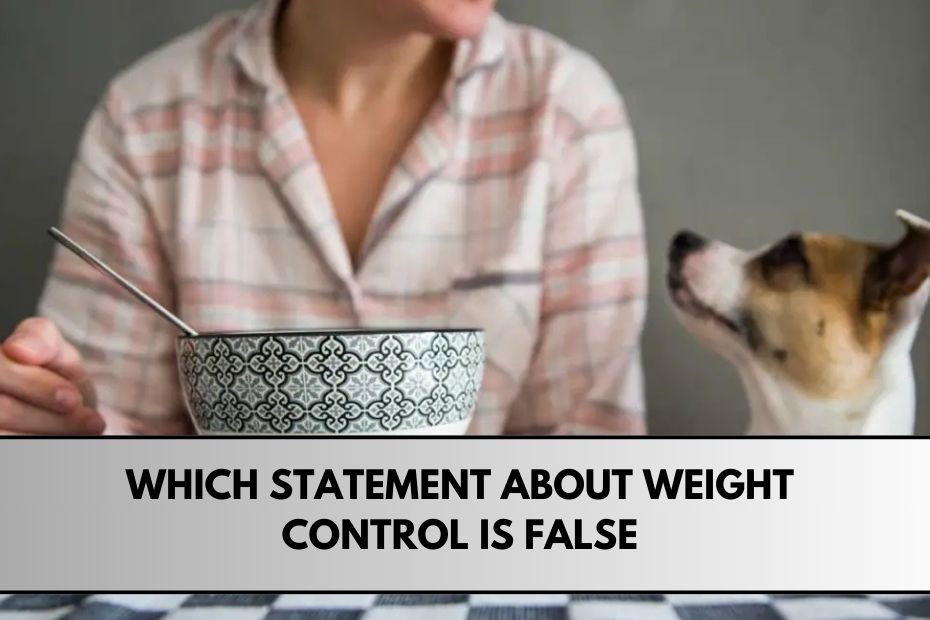Weight control is an essential part of a healthy lifestyle, helping to reduce the risk of chronic illnesses and improve overall well-being. Many people look for reliable information to achieve their weight goals effectively. However, myths and misconceptions about weight control are widespread, and some statements about it are entirely false. In this article, we’ll explore key facts about weight control, debunk common myths, and provide actionable tips to achieve a balanced and sustainable approach to weight management.
What is Weight Control?
Weight control refers to maintaining a healthy weight through a combination of diet, exercise, and lifestyle choices. A healthy weight is important for reducing the risk of obesity, diabetes, heart disease, and other health issues.
True and False Statements About Weight Control
Here are some common statements about weight control, with explanations to clarify whether they are true or false:
1. Eating Less Always Leads to Weight Loss
- False
While reducing calorie intake is essential, eating too little can slow metabolism and lead to muscle loss. Balance and portion control are key.
2. Skipping Meals Helps You Lose Weight
- False
Skipping meals often leads to overeating later, disrupting weight control efforts. Regular, balanced meals are more effective.
3. Exercise is Essential for Weight Loss
- True
Exercise helps burn calories, boosts metabolism, and supports muscle maintenance, all of which aid in weight loss.
4. All Calories Are the Same
- False
The quality of calories matters. Nutrient-dense foods provide vitamins and minerals, while empty calories from junk food lack nutritional value.
5. You Can Spot Reduce Fat
- False
Targeting fat loss in specific areas through exercise is not possible. Overall weight loss and toning exercises help reduce body fat.
Table: True vs. False Statements About Weight Control
| Statement | True/False | Explanation |
|---|---|---|
| Eating less always leads to weight loss | False | Over-restricting calories can slow metabolism. |
| Skipping meals helps lose weight | False | Skipping meals often leads to overeating later. |
| Exercise is essential for weight loss | True | Exercise helps burn calories and maintain health. |
| All calories are the same | False | Nutrient-dense foods are more beneficial. |
| Spot reduction of fat is possible | False | Fat loss occurs overall, not in specific spots. |
Tips for Effective Weight Control
- Balanced Diet
Focus on whole foods like fruits, vegetables, lean proteins, and whole grains. - Regular Exercise
Incorporate both cardio and strength training for effective fat loss. - Hydration
Drink plenty of water to support metabolism and prevent overeating. - Adequate Sleep
Poor sleep can increase hunger hormones and lead to weight gain. - Consistency
Small, sustainable changes are more effective than extreme measures.
Common Myths About Weight Control
- Carbs Always Make You Gain Weight
Not all carbs are bad. Whole grains, fruits, and vegetables are healthy carb sources. - Eating After 8 PM Causes Weight Gain
Weight gain depends on total calorie intake, not meal timing. - Fad Diets Work Long-Term
Most fad diets are unsustainable and lead to weight regain.
Conclusion
Weight control is a crucial aspect of maintaining overall health and well-being. By understanding the facts and separating them from common myths, individuals can make informed choices that lead to sustainable results. It’s important to focus on a balanced approach, incorporating regular exercise, a nutrient-rich diet, proper hydration, and sufficient sleep. Additionally, staying consistent with small, manageable changes rather than resorting to extreme or temporary solutions is key to long-term success. With the right information and a commitment to healthy habits, achieving and maintaining a healthy weight becomes achievable and rewarding.
Powerplant Body
FAQs
1. Can you lose weight without exercise?
Yes, but exercise boosts metabolism and improves overall health, making weight loss more sustainable.
2. How much water should I drink for weight control?
Aim for 8-10 glasses a day, depending on activity level and climate.
3. Are cheat meals bad for weight control?
Occasional indulgences can be part of a balanced plan, preventing feelings of restriction.

